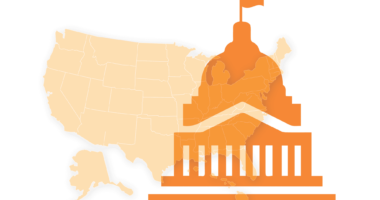Is Your State Prioritizing Social, Emotional, and Academic Development (SEAD)?
As the pandemic persists, many educators report that students are experiencing academic, behavioral, and personal challenges — resulting in difficulties in both learning, school engagement, and mental health. While most children are facing these struggles, these challenges fall disproportionately on Black, Latino, and students from families who are low-income and rural. U.S. Education Secretary Miguel Cardona and Surgeon General Vivek Murthy have called for increased investments in social and emotional learning as it has become clear that supportive school environments are central not only for students’ academic growth but also for their social and emotional development and well-being. States have the power to set policies, create guidance, and provide resources that lead districts and schools toward fostering supportive school climates for students.
Is Your State Prioritizing SEAD? is a tool developed by The Education Trust in partnership with CASEL that identifies specific actions states have taken, and can take, to ensure local districts and schools are supporting equity through social, emotional and academic development (SEAD). Building upon Ed Trust’s 2020 report, Social, Emotional, and Academic Development Through an Equity Lens, this tool highlights which policy areas will holistically support both social and emotional needs and academic learning for students. This tool looks at state policy in five areas:
- Discipline;
- Professional Development;
- Rigorous and Culturally Sustaining Curriculum;
- Student, Family, and Community Engagement; and
- Wraparound Services.
(The Education Trust previously examined a sixth key policy area on teacher diversity with the web tool, Is Your State Prioritizing Teacher Diversity & Equity?)
From the scans of state policies, we learn that many states are supporting SEAD in key ways. For example, some states such as New York, are intentionally ensuring students experience culturally sustaining education. Other states, like Minnesota, are prioritizing social and emotional professional development for educators to equitably and holistically address students’ needs and support students’ strength in learning environments.
The need to foster inclusive learning environments is not a new challenge. Black and Latino students were, and still are, less likely to experience positive school climates than their peers. Due to the pandemic, the past two years have been especially difficult for Black and Latino students as well as students whose families are low-income or live in rural settings. Students have faced economic uncertainty, social unrest, and, far too often, the loss of a loved one. These concerns continue as some states and groups strive to restrict the teaching of history and current events and a lack of understanding and misinformation causes confusion about SEAD efforts in schools.
All states have the responsibility to encourage and support districts and schools to adopt policies and practices that holistically and equitably support students. The resources available through Is Your State Prioritizing SEAD? can be used by advocates and state policymakers alike to identify their own state’s strengths and areas for improvement.
Removing policies that undermine SEAD is not sufficient for states to receive high ratings in this analysis. State leaders should move beyond a compliance mindset and adopt clear goals to encourage schools and districts to prioritize social, emotional, and academic development. Moreover, state leaders should provide clear and evidence-based guidance, policies, and resources to ensure schools and districts have the capacity to meet these goals and ensure data systems are strong enough to monitor progress. Thus, this analysis is not an end, but a beginning. By using this tool as a starting point, state leaders and advocates can explore and adapt strong policies and ideas from other states to improve their own. Let the progress commence.








